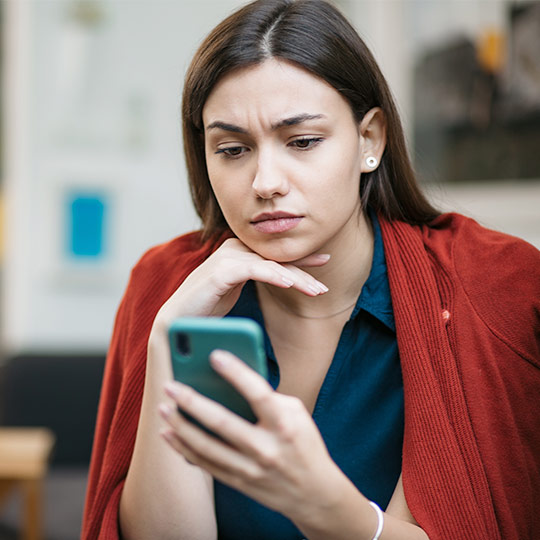Unwanted contact is any type of online communication that makes you feel uncomfortable, unsafe or harassed. It can be with a stranger or someone you know. Unwanted contact can include:
- being asked inappropriate or personal questions
- being sent upsetting or offensive content, including unwanted sexting
- being asked to send intimate images or do things online that make you feel uncomfortable
- being repeatedly contacted by someone even though you have asked them to stop.
You may actually welcome the contact at first, until the other person says or does something you don't like.
There are different ways someone can contact you and make you feel uncomfortable or unsafe. They include the following scenarios.
They use ‘bombing’ as a tactic to make it look like they are a mutual friend
They try to friend or follow as many people from your school, sports team, university or community to make you believe they are a ‘real’ person you haven’t met before. For example, they might pretend to be the same age as you or a ‘new’ student in your class.
Sexual grooming
This is when a sexual predator tricks someone under 18 into thinking they’re in a close relationship, so they feel OK about sending nudes or getting sexual in a live chat. Usually they’re an older person (often known as a ‘paedophile’) who plans to share the content with other sexual predators. Sometimes they pretend to be the same age and have the same interests as the child or young person, or they use flattery, gifts or promises to trick them.
Grooming can lead to child sexual abuse. Any sexual activity between a child and an adult is child sexual abuse. Sexual activity may be sexual intercourse, sexual touching or sexual acts that happen in person or online. It may involve coercion, force or implied force. Online child sexual abuse is any form of sexual abuse of a child under 18 that has a link to the online environment. Find out more about child sexual abuse online.
If you're under 18, the best way to get help is to report the unwanted contact to the Australian Centre to Counter Child Exploitation (ACCCE).
Hooking you with a fake profile
This is when someone makes a fake profile and pretends to be someone they’re not, so they can scam you. Sometimes this is called ‘catfishing’.
This person usually sends a direct message to you with a ‘sexy pic’ they claim is of them, then they might ask you to send a naked selfie or join a ‘sexy chat’. Next, they threaten to share the nude or recording of you with your friends, family or co-workers unless you pay them. This is a type of blackmail called sexual extortion or ‘sextortion’.
Cyberstalking
This is when a person keeps track of you online in a way that makes you feel uncomfortable, worried or threatened. They make repeated unwanted contact with you with calls, texts, emails or direct messages, and might even find you on different online platforms, so they make you feel like you can’t ‘hide’ from them. Find out more about cyberstalking.
‘Dick pics’ and other unwanted nudes
This is when you receive an unwelcome message, text, Airdrop, Nearby Share or email with an intimate image or video of the sender or of someone else. It can show a naked body of any gender or sexuality, or part of the body (like a ‘dick pic’). This is sometimes called 'cyberflashing'.
It can feel creepy or upsetting to receive unwanted nudes because it makes the interaction between the sender and you sexual without your consent. This is a form of sexual harassment.
